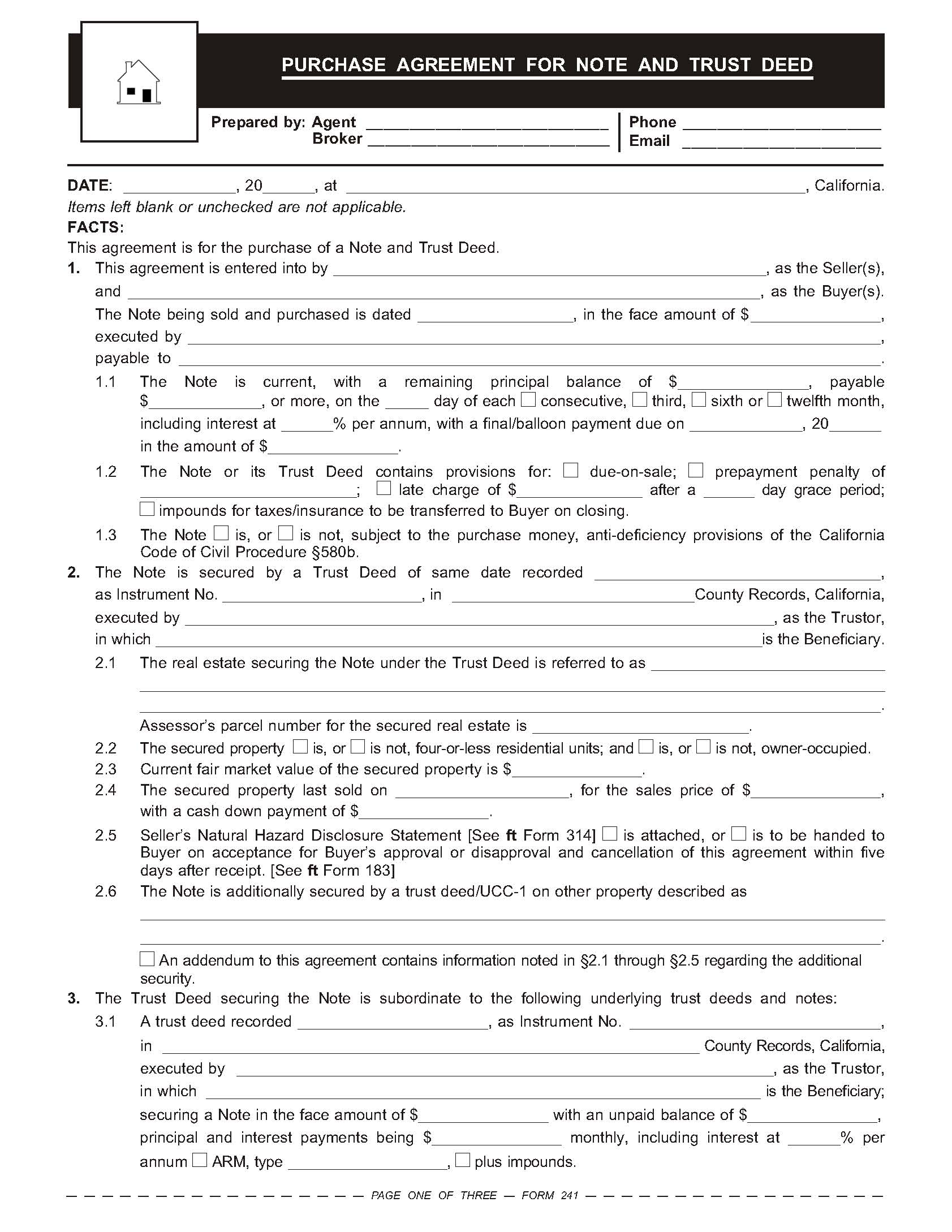Form-of-the-Week: Purchase Agreement for Note and Trust Deed – Form 241
Investors looking for higher yields with low risk need to consider investing in trust deed notes during periods of stable asset inflation and interest rates in the US economy. These conditions will come to exist at some future point as the nation’s economy and asset markets (bonds, stocks and real estate) settle into a maturing pattern of consistent and constant rise. 2016 is likely to give trust deed investors reason to buy existing mortgages in California.
A trust deed investor invests in a trust deed note in one of three ways:
- originating a mortgage evidenced by a note executed in favor of the investor and secured by a trust deed lien on real estate purchased or owned by the borrower;
- buying an existing trust deed note held by another; or
- making a collateral loan evidenced by a note executed in favor of the investor which is secured by an existing note and trust deed held by the borrower.
A negotiable instrument, such as a promissory note secured by a trust deed, contains an unconditional promise to pay a scheduled dollar amount to the holder of the note. A trust deed note, being a negotiable instrument, may be sold and assigned to others, such as a trust deed investor.
Buying a note and trust deed, such as a carryback mortgage, can be a reliable and profitable investment for trust deed investors, also called private money lenders or hard money lenders.
Comparable to a buyer of real estate entering into a purchase agreement with the advice and assistance of their transaction agent (TA), the trust deed investor buying a carryback note does so with the advice and assistance of their trust deed broker, also called a mortgage loan broker. [See first tuesday Form 241]
The investor’s trust deed broker gathers information provided by the person holding the note or their broker prior to preparing an offer to purchase a trust deed note for the investor’s review and signature. This information includes:
- the terms of the trust deed note;
- the existing title policy insuring the trust deed; and
- a profile on the real estate which is security for the note.
Editor’s note — A broker is employed by a note holder to act as their exclusive agent to negotiate the sale of the note under a trust deed listing agreement. [See first tuesday Form 112]
After the information is obtained and reviewed with the investor, the trust deed broker prepares a note and trust deed purchase agreement. [See first tuesday Form 241]
first tuesday’s Purchase Agreement for Note and Trust Deed is used by a trust deed broker as a checklist of conditions considered by a prudent trust deed broker when negotiating the purchase of an existing trust deed note held out for sale. The purchase agreement states the price and conditions on which the trust deed investor will purchase the trust deed note. [See first tuesday Form 241]
The Purchase Agreement for Note and Trust Deed contains provisions describing:
- the terms and identity of the note being purchased, such as the payment schedule and the existence of a final/balloon payment, due-on clause or prepayment penalty provision;
- any senior encumbrances of record;
- the real estate securing the debt, including its current fair market value (FMV), the type of property and whether it is owner-occupied;
- the terms of the purchase of the note, such as the purchase price;
- whether the note is to be transferred by way of an assignment or endorsement; and
- the brokerage fee to paid and by whom. [See first tuesday Form 241]


















Where can i find any type of disclosures that apply to note brokering? Or if here in First Tuesday, what are the form numbers?
Jorge, Thank you for your inquiry!
The following forms can be found under in our first tuesday forms library:
Form 233 – Loan Transmittal Summary – Preliminary Submission to Lender
Form 235-2 – Lender/Purchaser Disclosure Statement – Sale of Existing Note (BRE 851B)
Form 235-3 – Lender/Purchaser Disclosure Statement – Collateral Loan (BRE 851C)
Form 242 – Agreement to Hypothecate
Form 414 – Trustor’s Offset Statement
Further, the Purchase Agreement for Note and Trust Deed (Form 241 above) can be used as a checklist for everything needed in the transaction. Additional forms are refereed within the form.
Fernando,
Do you have a pdf version of the purchase agreement you reference? Thanks.
A fillable pdf version is available by clicking on any highlighted Form 241 reference or by clicking on the form itself within the article.
I have used first tuesday for over 20 years and found the information relevant and useful.